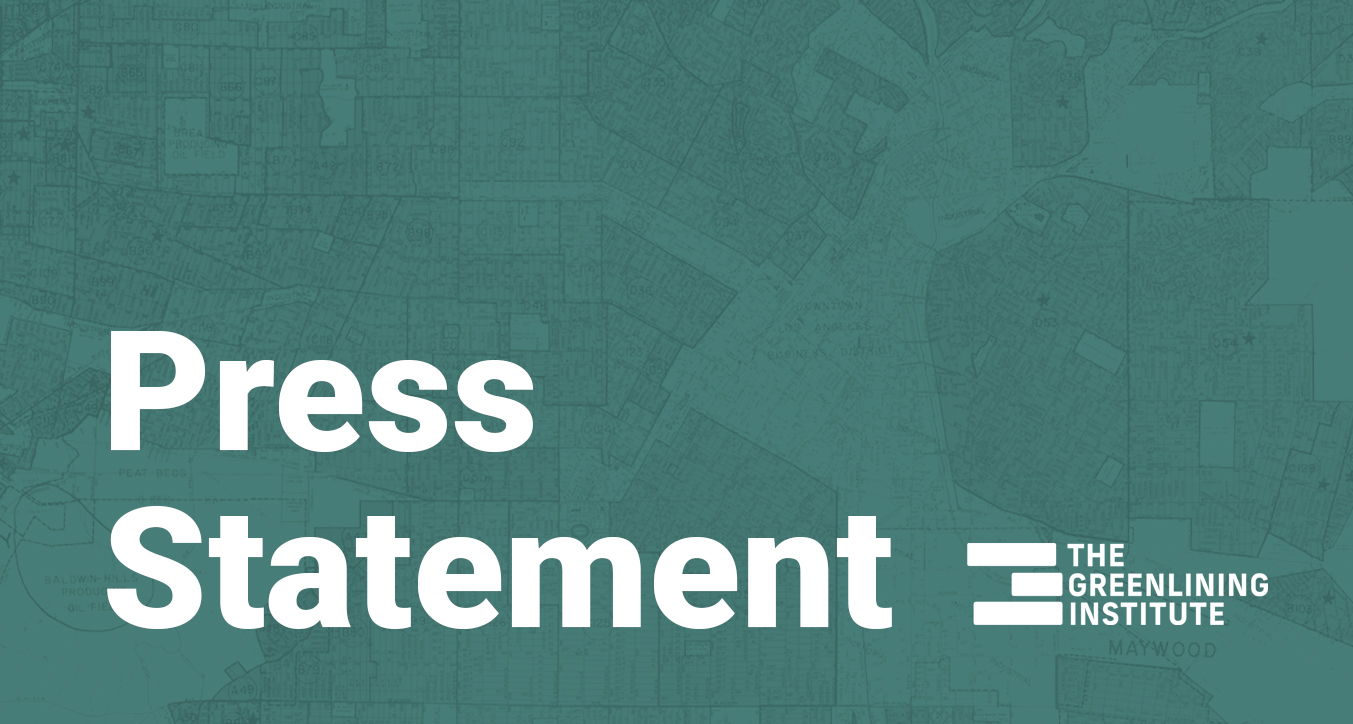Introduction
California consistently serves as a leading example of influential, progressive decision-making, setting an example for the rest of the nation on what equitable policy can look like. When it comes to The Greenlining Institute’s legislative priorities, we take California’s role as leader seriously. We invite legislators to join us in this work.

Sponsored Legislation
AB 302: State Automated Decision Systems Inventory Act
California’s institutions increasingly rely on automated decision systems to make critical determinations that impact our day-to-day lives. This includes decisions – made by algorithms and machine learning techniques – about who can access social safety net programs, who gets parole, and how to collect taxes.
This technology has the potential to improve efficiency, accuracy, and transparency. However, these systems are still new and evolving, and can have deficiencies that lead to unfair, biased, and inaccurate results, causing disproportionate harm to low-income families and communities of color while also undermining trust in the public sector.
AB 302 authorizes the California Department of Technology to conduct a comprehensive inventory of all high-risk Automated Decision Systems used by state agencies. The inventory will identify the decisions these systems make or support, the potential benefits of these systems and the measures taken to reduce the risk of inaccurate, unfairly discriminatory, or biased automated decisions. All Californians, but especially communities of color and low-income communities need access to this information to understand how decisions are being made that impact our lives and the lives of our families.
Resources
- AB 302 Department of Technology: High-Risk Automated Decision Systems
- Report: Algorithmic Bias Explained: How Automated Decision-Making becomes automated discrimination
SB 253: Climate Corporate Data Accountability Act
Corporate emissions contribute to over-polluted communities and deadly climate outcomes from harsher wildfire seasons to historic storms and floods. The worst of these impacts disproportionately fall on communities of color and low-income communities.
SB 253, The Climate Corporate Accountability Act, requires US-based corporations with operations in California and annual gross revenue of $1 billion USD or greater to disclose their full greenhouse gas (GHG) emissions footprint to the public. Research has found that corporations have an outsized impact on our climate due to excessive GHG emissions. The disclosure required by SB 253 allows the public to hold corporations accountable for their role in the climate crisis.
With the Climate Corporate Accountability Act, California would be the first state in the nation to demand climate pollution transparency, recognize the right of communities to know how and if corporations are working to reduce their emissions, and address the importance of verifying corporate claims of sustainable leadership.
Resources
- SB 253 Climate Corporate Data Accountability Act
- Press Statement: California Senators Announce Climate Accountability Package To Raise The Bar For Corporate Climate Action
AB 1525: Equity Carve Out for Transportation Funding
Communities of color disproportionately face exposure to transportation-related air pollution, longer commute times, and a lack of access to safe infrastructure and reliable mobility options due to decades of deliberate discrimination and systemic disinvestment. While the State’s transportation agencies have put forth a range of equity initiatives, the persistence of harmful development and inadequate investment in California’s low-income communities and communities of color signal a need for greater reform.
AB 1525, The Equity First Transportation Funding Act, requires that a minimum of 60 percent of all eligible transportation dollars be allocated to projects that are located in and provide benefits to “disadvantaged” communities, as defined by the State. The Act would also require that all proposed projects are evaluated to ensure they provide benefits and avoid harms in disadvantaged communities. This bill will help ensure that crucial investments flow to communities with the greatest needs, while the evaluation process is designed to protect communities from further harm.
California’s existing climate programs, like the Active Transportation Program, demonstrate the power and potential of establishing equity targets and a project evaluation process, but the absence of a clear, uniform mandate across the transportation sector limits California’s ability to meet our climate and equity goals. AB 1525 can help the state begin to repair the harms of our transportation system’s impact on communities of color.
Resources
AB 591: Electric Vehicle Charging for All Act
Communities of color and low-income communities disproportionately bear the consequences of climate change, yet have been the last to benefit from California’s clean transportation transition due to high-costs and deliberate disinvestment resulting in a lack of infrastructure in the areas they live and work. Not only are these communities isolated from the health and economic benefits of clean transportation, but they also tend to live in the most polluted neighborhoods with the least amount of mobility options leading to an overreliance on gas-powered vehicles and worse pollution-related health outcomes.
AB 591, The Electric Vehicle Charging for All Act, requires that all electric vehicle charging stations must be accessible to all electric vehicles. This bill ensures that California’s charging infrastructure functions with all EV models, and not just luxury EVs that are out of reach of the majority of Californians. The Electric Vehicle Charging for All Act, is an opportunity for California to make electric mobility more accessible and ensure EV infrastructure is accessible to everyone in the state.
Resources
- AB 591 Electric Vehicle Service Equipment: Universal Connectors and Public Accessibility
- Press Statement: Building Upon Federal Action, Assemblymember Jesse Gabriel Introduces the Electric Vehicle Charging for All Act
- Blog: Achieving Electrification Equitably: Principles for Building EV Charging Infrastructure For Everyone
BUDGET PRIORITIES
2023-24 California Budget Priorities
Key Budget investments we are watching during the legislative session include:
- Investment in the California Racial Equity Commission. The Budget includes $3.8 million in 2023-24, and $3.1 million through 2028-29 in the General Fund to support the state’s first Racial Equity Commission established by Executive Order last year.
- Continued investment in the State Small Business Credit Initiative (SSBCI). With over 320,000 small businesses already receiving grants for COVID-19 relief, the Budget includes $6 million in 2022-23, and $26 million ongoing investments for technical assistance, and $8 million in one-time funding to support women owned businesses.
Potential Budget cuts and delays we are watching during the legislative session include:
- Reductions to Affordable Housing Programs. The Budget includes $350 million in General Fund reductions related to housing programs that were included as part of the 2022 Budget Act. Despite these reductions, approximately $2.85 billion remains intact based on the commitments made for the 2022-23 and 2023-24 fiscal years.
- Delayed funding for Equitable Building Decarbonization. $370 million in funding for building decarbonization will be delayed for this, and future years.
- Reverting funds for the California Arrearage Payment Program. The Budget reverts $400 million put in place to provide relief to struggling households suffering from large amounts of utility debt.
- Reductions and delays for climate initiatives.
- A reduction of $65 million in 2022-23, and $40 million in 2023-24 for the Transformative Climate Communities Program that empowers communities that are most impacted by pollution the ability to choose their own goals, and projects to reduce greenhouse gas emissions, and improve local air quality.
- No funding for Regional Climate Collaboratives, and a $85 million delay in Community Resilience Centers investments, ultimately weakening efforts to bolster community capacity to combat and withstand climate change impacts.
- Transportation Trigger Reductions. Trigger reductions include cuts to transportation initiatives aimed at expanding mobility and reducing harmful emissions.
- A net reduction of $200 million for the Active Transportation Program that expands opportunities of active mobility, such as walking and biking.
- An overall $1 billion in reductions over the next three years across various zero-emission vehicle programs.
Resources
Coalition Partners
Greenlining is a proud member of the following coalitions


Contact
For more info: Melanie Morelos, California Strategy Senior Program Manager, melanie.morelos@greenlining.org
For press inquiries: Danielle Bell, Media Relations Senior Program Manager, danielle.bell@greenlining.org
To learn more about The Greenlining Institute’s California Legislative Agenda, please visit our blog.




